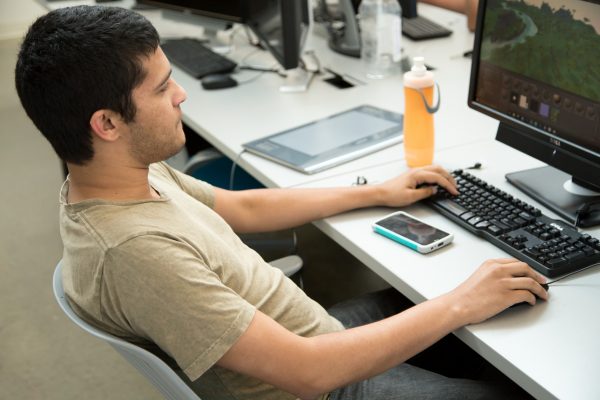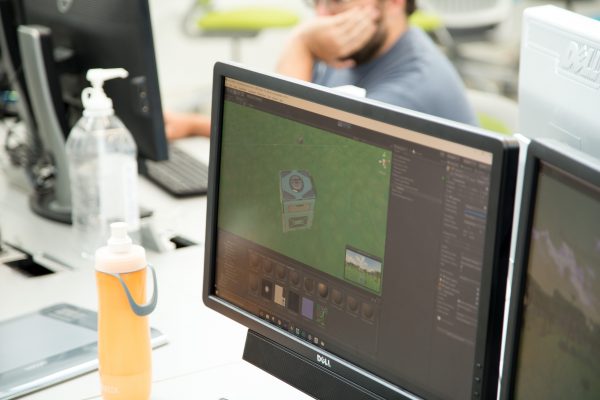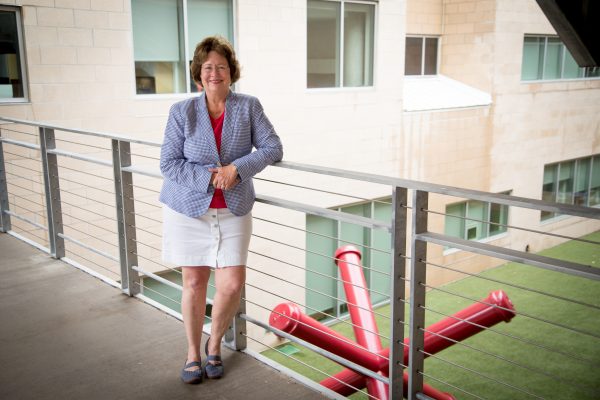The Quest
In his 1938 book Homo Ludens: A Study of the Play-Element in Culture, Johan Huizinga discusses the importance of playing games in the history of human culture and society, stating “Play is older than culture, for culture…always presupposes human society, and animals have not waited for man to teach them their play.”
Theorists find it difficult to classify game playing under any singular definition, as the act blends an array of cultural and psychological concepts. Modern advancements in electronic games (EG) allow researchers and health professions the ability to utilize information gathered from these perspectives for therapeutic treatment. Known as electronic games for psychotherapy (EGP), or ‘serious games,’ UT Dallas assistant professor Dr. Marjorie Zielke and her team in the ATEC program are able to deepen their knowledge and critical insight to better diagnose patients who suffer from chronic back pain. Serious games employ the use of virtual reality (VR) to simulate a recreation of real life events wherein patients can interact kinetically during rehabilitation.
Dr. Zielke’s project, Planet VRGE (Virtual Reality Graded Exposure), is a “fear avoidance model” video game using motion capture technology, in this instance a Microsoft KINECT 2, that aims to discover prescriptive solutions based on user feedback. In this VR simulation, users embark on a mission – not unlike the concept of the hero’s journey in Joseph Campbell’s The Hero with a Thousand Faces – to Planet VRGE where they must achieve objectives through transference, the unconscious redirection of feelings, for the betterment of future colonists.
Answering the Call
A recent study from Fribourg and Geneva Universities reports an 84% lifetime incidence of lower back pain.

Researchers and patients who suffer from chronic back pain are presented with a unique challenge on their quest to achieve an accurate diagnosis. While the treatment of physical pain is the overarching ailment, there are a wide range of factors contributing to this issue that make it difficult to pinpoint a precise pathological treatment. Fear, neurological feedback, and subjective experience, for example, are a few of the concerns patients and researchers both face.
The journey begins when every hero “answers the call” and alongside patients, Dr. Zielke and her team have done just that.
With the creation of their serious game project Planet VRGE, Dr. Zielke and her team look to serious games to advance medical treatment, as well as patient care and rehabilitation, by utilizing the classic paradigm of the adventure story.
“Through a gaming experience, which in a multi-tiered way allows us to replicate life,” Dr. Zielke explains, “we can give people education experiences such as going to a foreign country or working with a certain type of patient…things that they [patients] are eventually going to do in face-to-face situations.”
On Planet VRGE, patients undertake the mission of preparing the environment for the arrival of colonists by remotely piloting a robot, SPINEFI 17, by using their using their body. Patients have three objectives: set up air machines, plant gardens, and build shelter. SPINEFI 17 can only be optimized for one hour each day and participation helps patients exercise and gain interactive life experience.
For gamers, the process of leaving Campbell’s “ordinary world” and stepping into the “extraordinary” landscape of Planet VRGE has been created with extreme consideration. The design and structure of Planet VRGE was deliberately assembled to allow Dr. Zielke and her team to make psychological, as well as physiological, conclusions. Patients, for example, are allowed to customize SPINEFI 17, self-control and monitor their progress, and are rewarded based on milestones; a few of the many options from which Dr. Zielke is able to extrapolate tolerance and motivational information from.
Crossing the Threshold, the Road of Trials, and the Ultimate Boon

Once patients have modified SPINEFI 17, they are able to engage in the task of building the planet. Using their body to maneuver SPINEFI 17, patients must perform specific movements related to each objective. To be fully immersed into this landscape, Dr. Zielke continues by building on brain sciences knowledge to better produce the augmented reality of Planet VRGE, including sounds for the robots and the overall space theme. Details, however minute, have the potential to modify patient behavior, such as suspension of their belief.
Every journey comes with its share of trials and tribulations. When pain is subjective, accurate treatment is hard to prescribe. For instance, steroid injections may be a feasible option for some chronic back pain suffers, but inadequate for others. Also, it is important to note that physical pain can trigger depression and ailments related to socialization, sleep, as well as inactivity. The process of obtaining information lends itself to a trial process, as researchers and doctors work to identify a patient’s concerns and treat them.
“What I think is really important in terms of my research is that we keep pushing the envelope in the terms of the level of fidelity that we are able to get with our virtual humans,” Dr. Zielke tells us. “We are increasingly using them in more and more complex types of situations.”
Similar to Dr. Zielke’s award-winning First Person Cultural Trainer (FPCT) project, a training aid which instructs military personnel on cultural customs for their duty in Afghanistan and Iraq, patients on Planet VRGE are guided throughout their mission with opportunities for breaks between each activity, as well as to provide feedback. These options allow the patient opportunities to rest and continue when they feel physically capable. This ability to self-control can provide both a medium to obtain measurable research on pain thresholds, as well as a platform for those who suffer from psychological fear of pain caused through movement. These options aid researchers in making better determinations toward each individual’s diagnosis.
As Campbell tells us: “The cave you fear to enter holds the treasure you seek.”
The prospect of pain free movement lies at the heart of the adventure. While patients may be reluctant to explore the possibility of game therapy for fear of physical distress, the quest holds some key levels in unlocking the mystery of chronic pain treatment, as well as less invasive methods to treatment, such as non-drug management and behavioral modification.
Mastering the Two Worlds and the Freedom to Live

“Questing,” Campbell reminds us, “is not an ego trip; it is an adventure to bring into fulfillment your gift to the world, which is yourself.”
Though virtual therapies are still evolving, serious game solutions for non-drug management are already being tested in mental health fields. Gaming alternatives allow researchers an opportunity to pull from a gamut of user experiences to personalize their diagnosis, giving the user an unprecedented medical care, as well as knowledge of new coping mechanisms and alternative lifestyle possibilities.
As director of the UT Dallas Center for Modeling and Simulation and director of ATEC’s Virtual Humans and Synthetic Societies Lab, Dr. Zielke has won numerous awards for her work including two recent Best of Show awards for simulation in healthcare. A supporter of virtual learning environments, she and her team are also working on a virtual teacher simulation collaborative project to aid in language training for children diagnosed with dyslexia.

You must be logged in to post a comment.